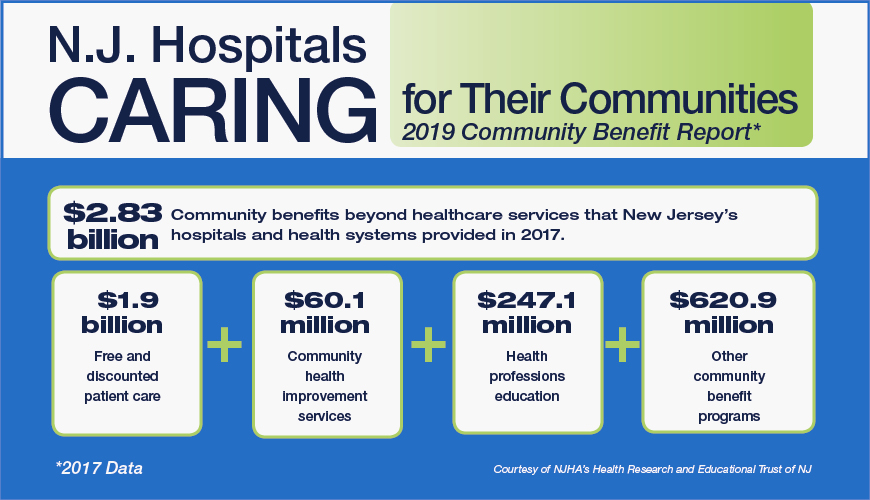 New Jersey’s nonprofit hospitals contributed $2.83 billion in community benefit support within their local communities in 2017, a commitment that includes free and discounted care along with support for social determinants of health including nutrition, housing and education.
New Jersey’s nonprofit hospitals contributed $2.83 billion in community benefit support within their local communities in 2017, a commitment that includes free and discounted care along with support for social determinants of health including nutrition, housing and education.
Those are the findings in the 2019 Community Benefit Report issued today by the New Jersey Hospital Association. The report is based on data provided by the state’s hospitals, in accordance with standard industry definitions of programs considered “community benefit.” Criteria for programs to be called a community benefit include generating a low or negative margin, responding to the needs of New Jersey’s diverse populations, responding to public health needs and education or research that improves overall community health.
“Healthcare used to be centered in the hospital; now it’s centered in our communities,” said NJHA President and CEO Cathy Bennett. “That’s part of a sea change in healthcare today, and it’s reflected in the billions of dollars invested by New Jersey’s hospitals and health systems to promote good health for their neighbors and their communities.”
Highlights from New Jersey’s report include:
- $1.9 billion in free and discounted care for the uninsured, underinsured and others without the means to pay
- $60 million in community health improvement services including programs and partnerships for patients, consumers and community members targeting issues such as nutrition, safety, exercise and other local health needs
- $247 million in health professions education to prepare the next generation of physicians, nurses and other healthcare professionals, and
- $621 million in other community health programs, which includes donations and subsidized health services, defined as programs that a hospital or health system provides to meet a community need, despite financial losses.
The full report is available at www.njha.com/community-benefit-2019.
NJHA and its Health Research and Educational Trust produce the report annually. Today’s release coincides with consideration of a bill in the New Jersey Legislature that would formalize a standard community contribution for nonprofit hospitals to provide additional support to their municipalities in recognition of the public services hospitals receive, while reaffirming the hospitals’ property tax-exempt status.
The legislation would not alter the type of local support captured in the Community Benefit Report, but it provides further opportunity for hospitals and their host municipalities to work collaboratively to support the well-being of residents. The measure is being considered today by the Assembly State and Local Government Committee.
“We believe that this legislation is an extension of the very important relationship that exists between a hospital and its host municipality,” said NJHA’s Neil Eicher, vice president of legislation and policy. “New Jersey’s nonprofit hospitals have stepped forward to endorse this bill to voluntarily add more financial support for their municipalities.” (Click here for the full testimony.)
The measure would address a long-unresolved issue in New Jersey stemming from a 2015 tax court decision that questioned the tax-exempt status of one hospital, Morristown Memorial. That single ruling has led to years of uncertainty for hospitals across the state and a number of lawsuits pitting municipalities against their local hospitals. The compromise bill aims to provide a statewide solution that solidifies support for communities.
“Hospitals have a responsibility not only for the patients in their care, but also for the health of the broader community. That’s what population health is all about,” said Bennett. “This Community Benefit report reflects the depth of that commitment, along with a pledge to work collaboratively with other stakeholders on the broader societal challenges that have a tremendous influence on our health.”